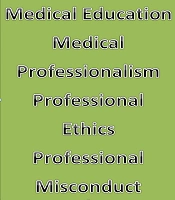Dear Editor,
Medical schools strive to inculcate medical professionalism among their students. Different strategies like clinical exposures, role plays, reflections, and lectures are used to make the students adopt such practices that may help them become better medical professionals in the future. Nevertheless, have we been successful? Medical professionalism is an attitude learned more by imbibing from its practice in the environment (1). However, the environment, unfortunately, is not conducive to the same. There is an unapologetic display of unprofessional conduct everywhere students go during their medical training, be it in classrooms, training and research laboratories, clinics and hospitals, and of course, the general world in which they live. In classrooms, many teachers are not interested in 'teaching.' They come unprepared and take classes to just being done with the work. They are laid back in their profession and not upgrading themselves. There are student abuse and nepotism (2). In clinics and hospitals, there is unrestrained use of foul language for interpersonal communication, and doctors show unempathetic behavior toward patients, colleagues, and students (3). Government sector doctors divert patients to their private practice setups and prescribe unrequired investigations and overpriced medicines to obtain their share of profits from labs and pharmaceutical companies (4). They also admit patients when they could be managed with home care to give ‘business’ to their hospital. Moreover, there are discrimination and gender harassment (5), as well as oppressive and suppressive exertion of powers of hierarchy (6). In research, the students see fabrication and manipulation of data, unethical research practice to suit the vested interests of the researcher, clinicians, pharmaceutical companies, and political stakeholders (7), as well as guest and ghost authorships, plagiarism, and infringement of intellectual property rights (8). Even in their general surroundings, they witness malpractice by medical professionals and doctors adopting illegal means to evade their due taxation (9); corruption in the purchase and supply of hospital equipment, drugs, and other consumables and non-consumables (10); sexual harassment; power abuse; drug abuse; and breach of agreement of confidentiality. The list seems endless; the more you ponder, the more such instances come to light. Most of us have exhibited such unprofessionalism at times and are answerable to the question: Do we practice what we teach? Can we expect professionalism from students groomed and 'taught' the same in such an environment? Given the prevailing times where the students have a lot of exposure and insight, it is difficult to assume that they will learn professionalism from an artificial environment where presentations stand in sharp contrast to reality. Some self-motivated students may indeed be able to learn it. However, overall, unless the current generation of healthcare service providers mends their ways, professionalism shall only continue to be merely glorified in papers without coming into actual practice. It calls for sincere and collective efforts from all stakeholders to recourse to good practice of medical professionalism. The reasons behind the acts of unprofessionalism should be identified, and appropriate measures should be taken to ensure that the medical profession is practiced well and prevent it from further deterioration. Only then can we expect the teaching of medical professionalism to become meaningful.
